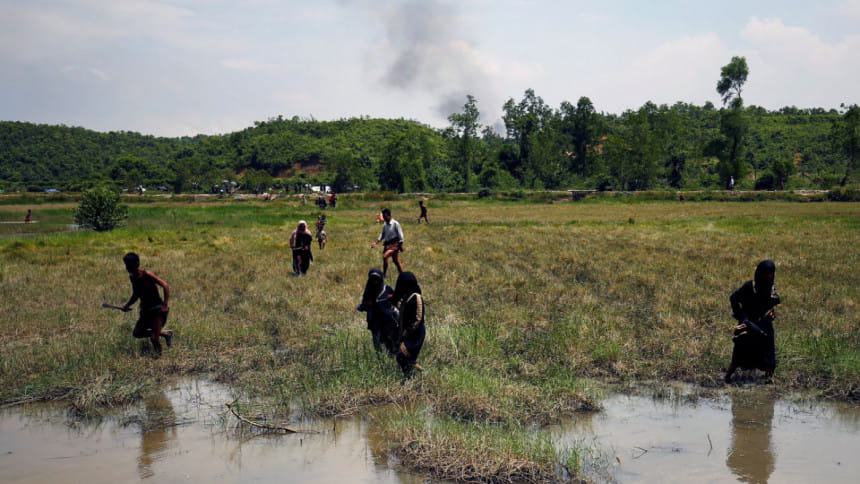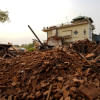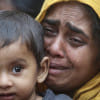Myanmar military's murderous melodrama

Myanmar has based its entire brutal, shameless operation on unarmed Rohingya civilian men, women and children, on the vaunted single incident of August 25 when reportedly, and not corroborated by any independent authority or news agency, extremists attacked simultaneously more than 30 police posts and an army base in Rakhine State along the border with Bangladesh. If true, suffice to conclude that Myanmar's intelligence is in dire straits.
It befuddles the mind how many activists and how much time would have been necessary on the side of the "insurgents" to plan and execute such a wide-ranging stealth operation, stretched over several miles. According to experts, the manpower on the attacking side would have to be in the thousands, and amazingly, no Myanmar intelligence agency had an inkling of a clue. Therefore, one cannot simply blow away the conspiracy theory that indeed the attacks on army posts were carried out by the Myanmar army and/or their cohorts, so as to level the blame on the Rohingyas for the meticulously planned ethnic cleansing. The result: Over half a million innocent Rohingyas, many riddled with bullet, machete and burn wounds, seeking refuge in Bangladesh.
The Myanmar military said (on August 25 that) about 150 Rohingyas attacked an army base in Taung Bazar village in Buthidaung township. Therefore, attacking thirty installations would require about 5,000 attackers. (Myanmar) Military sources told Reuters (in Yangon) they estimate 1,000 insurgents took part in the offensive. Where were they trained? Where did they set up camp? Is it possible that none on the side of the Myanmar military or police could see any one of them? Where did the thousands of insurgents vanish? Given the gruesome attack on the civilian population they purportedly support, and the 59 insurgents they lost on day one, it was natural that the insurgents would retaliate, or try to make some noise, a patka here and an arson attack there, but it is baffling they went absolutely silent.
In another development, a Myanmar army online statement claimed that a mass grave with bodies of 28 Hindus including several children, allegedly slain by Rohingya Muslim militants, had been discovered on September 24 in Myanmar's restive northern Rakhine State. The same source claimed the following day (September 25) that bodies of another 17 Hindus were discovered.
According to the Myanmar military, ARSA (Arakan Rohingya Salvation Army) elements killed the villagers a month ago on August 25, the same day the group raided police outposts. So, there would actually have to be more insurgents. The disinterred bodies were on display for the press (local and foreign). Why should month-old dead bodies be kept unburied or cremated for two days for the chaperoned press to see on September 27? They are hard to keep even for a couple of hours.
Even if it is assumed that the insurgents killed the Hindus, would it not have been easier for the so-called insurgents to set alight dead bodies rather than taking the time and trouble to dig graves for so many and bury the bodies? The entire story stinks (pun not intended) of an attempt by the ruthless Myanmar junta to fan religious sentiments among Hindus (particularly in India). Incidentally, VOA Burmese could not confirm this account, nor was it possible to verify separate allegations that the military was involved in massacring the Hindus.
Myanmar's appetite for isolation and cocoon comfort has not died down despite the country being forced to cede to international pressure in 2011, ending nearly 50 years of military rule, well almost. It took another four years to have a general election that gave the ever-so-silent Aung San Suu Kyi's National League for Democracy (NLD) a landslide victory. Ardently certain that a boba has no enemy, she bizarrely took office as Nidhiram Sardar, sans sword or shield. Any other leader striving for democracy would have refused the status she has been enjoying since April last year as state counsellor (a position similar to prime minister) when it appears state power lies somewhere else in the barracks. Or, is her "helplessness" also a ploy, as she covertly carries out her hate-Rohingya schema?
What democratic country in the world today would want to lay landmines under the supervision of a Nobel Peace Prize laureate? This concept is older than World War II, and it is hilarious (and grossly alarming) at a time when the Third is actually being fought over Tweets by Tom in Washington and Jerry in Pyongyang. There is no precedence of revoking a Nobel Prize, but hey Oslo! Would you not do so if it was revealed that a winner in say physics or chemistry or literature was post-award found to have cheated somewhere, sometime? Since we have never had a war-mongering Nobel laureate, peace at that, there is always the cause for a first time.
USA, the EU and some other countries, upset as they are with Mynamar military's madness and its government's collusion, are closer this October to applying various economic, diplomatic and military sanctions against Myanmar. The heinous booby traps laid along the border to kill returning citizens (men, women and children) with internationally banned antipersonnel landmines should pave the way to accelerate embargoes.
According to Tirana Hassan, Amnesty International's Crisis Response Director, reacting in early September, "This is another low in what is already a horrific situation in Rakhine State. The Myanmar military's callous use of inherently indiscriminate and deadly weapons at highly trafficked paths around the border is putting the lives of ordinary people at enormous risk."
Myanmar chose to be isolated for half a century. The world watched in amusement from a distance because its military was a terror within the country, but dormant to the outside. The same military would be foolish to assume that today's united people of the world and the conscientious societies would tolerate its idiosyncrasies for long, especially after cold-blooded murder when thousands of innocents have been uprooted from their homesteads and country.
Dr Nizamuddin Ahmed is a practising architect at BashaBari Ltd., a Commonwealth Scholar and a Fellow, a Baden-Powell Fellow Scout Leader, and a Major Donor Rotarian.










Comments